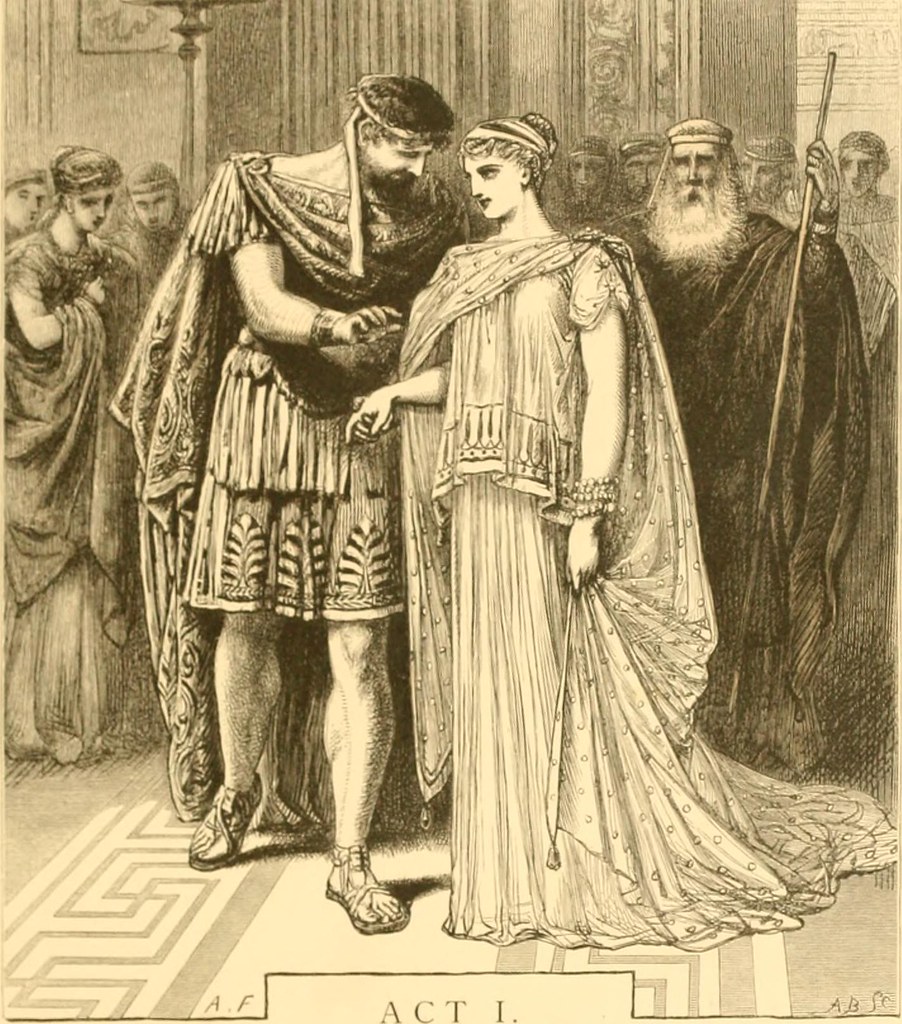by Marcella Kearns
STRANGE SNOW. When I hear the title of Stephen Metcalfe’s
play, I think of war. And comedy. An odd juxtaposition on the surface, but
other than the surface reasons — that the play features veterans of war and verbal wit — here’s why: The same phrase appears near the end of William Shakespeare’s
comedy A MIDSUMMER NIGHT’S DREAM, a play packed with juxtapositions of
opposites and extremes.
Metcalfe draws his inspiration for the title, he says, from
the possibilities and gentleness of snow. (See Michael Wright’s director’s
notes when you come to the performance!) Nevertheless, the connection to
MIDSUMMER is undeniable and, to me, endlessly evocative.
 |
| A tenderer take on Theseus and Hippolyta, as they, like our protagonists, forge their path through strange snow... |
War and comedy. Both SNOW and DREAM open after a conflict and dip into the potential for love. At the opening of DREAM, Theseus, Duke of Athens, addresses his intended, the Amazon queen Hippolyta, with a stark acknowledgment of what has transpired prior to the action of the play: “I woo’d thee with my sword,/ And won thy love doing thee injuries...” (1.1.16-17) He has taken her to Athens without her consent, but plans to wed her “in another key,” shifting the tenor of their initial encounters to “pomp” and “reveling.”
Hippolyta doesn’t have much to say in the first scene. Indeed, some productions of the play have introduced her as a prisoner, clearly unwilling—caged, cuffed, or at the very least staring daggers. Others have from the start softened Theseus’ words and her portrayal to imply that history is history, her assent is assured, and their conflict now is only how to interact with each other in this new “key,” as spouses.
The beginning of this play, for Theseus and Hippolyta, is aftermath, an attempt at a different path. An extreme shift, like
many others: deep young love and passion flipped to disgust and hate, and vice
versa, due to fairy mischief. Artisans trying their hands as artists. Fairies
altering the very seasons of the earth with their own ferocious conflict.
(Anyone recently encountered a 65-degree temperature swing in a day?)
Most
notably in this vein, when Theseus calls for entertainment at his wedding, the
piece he chooses is one performed by men of Athens — the tragic story of lovers
Pyramus and Thisbe. Why does it catch his attention? The company of performers’
description promises “very tragical mirth.” How can those two things coexist?
“Merry and tragical?...” he exclaims. “That is hot ice, and wondrous strange
snow!” (5.1.58-59)
There’s that phrase. Hot ice, strange snow. What apparent
opposites can coexist.
Listening to rehearsal for STRANGE SNOW across the hall
tonight, I hear it. Actor Marques Causey seems to be developing Davey, a
Vietnam veteran, as generally soft-spoken (in part, perhaps, due to the
character’s constant nursing of a hangover), while Ken Williams’ Megs, fellow
veteran, roars with life and urgency. (I even hear him singing as he strides
down the hall to his rehearsal call.)
Within each of these characters a paradox
exists: Megs, pouncing voraciously on any joy, welcoming word, kindness, or
company, is prone both to utter gentleness and sudden, almost unconscious
violence upon himself. Davey pushes company away in one second and runs headlong
towards it in the next.
As Krystal Drake plays her, Davey’s sister Martha, rounding
out the cast of characters, defies expectation by accepting a beer for
breakfast when she appears to be the most buttoned-down of all. She chooses to
embrace rather than shrink from possibility, even as she calls herself a coward. And she sometimes unaccountably, but courageously, stays present for Megs and Davey
rather than walking away.
All of them, both within themselves and in relation to
one another, are walking paradoxes. Frozen and thawing both.
 |
| Martha (Krystal Drake), Megs (Ken T. Williams) and Davey (Marques Causey) each grapple with the paradoxes of their lives in STRANGE SNOW. |
Listening, curious, I find myself this rehearsal night
considering what else they share. For some, common ground lies in their history
with one another. Megs and Davey claim membership in a fraternity which only
those who have been to war can ever know. They share, moreover, a specific wound
and loss from their tour in Vietnam. Siblings Martha and Davey, on the other
hand, have known the same steep family expectations, pain, and alliances. No
surprise on those counts.
For Megs and Martha, however, and the renewed
acquaintance of Megs and Davey, this story offers what Shakespeare’s comedy
offers: that history has the potential to be history.
Not something to forget — on that note I wish to be very clear. I refer to history that can be held in memory without forever freezing the
character who’s traversed it. Not unlike Theseus’ wish for his marriage to
Hippolyta, however flawed or hopeful any production paints the portrait of that
relationship, life for these three in STRANGE SNOW continues. And with it, the potential,
at the very least, for something new.
Here’s to the seasons altering.
STRANGE SNOW runs Feb. 22 to Mar. 17 at the Broadway Theatre Center's Studio Theatre, 158 N. Broadway. Now through Feb. 23, you can take advantage of our Hot Ice Presale and SAVE 25%! Use the code "Hot Ice" in person, via phone at 414.291.7800, or through our online box office.

No comments:
Post a Comment